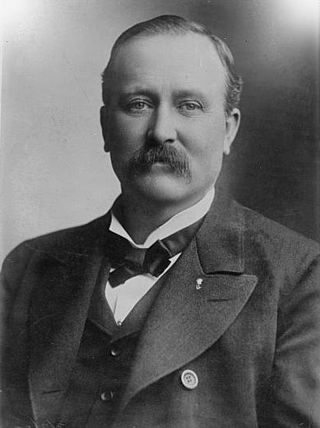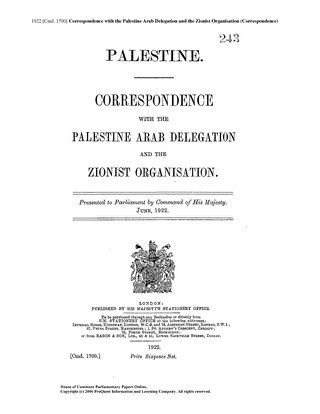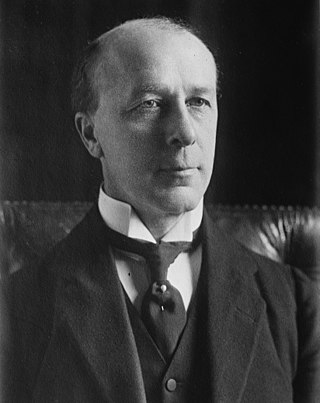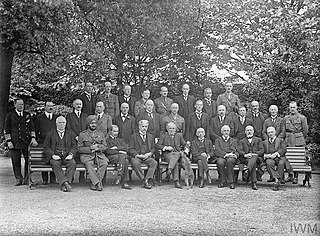
David Lloyd George, 1st Earl Lloyd-George of Dwyfor, was Prime Minister of the United Kingdom from 1916 to 1922. A Liberal Party politician from Wales, he was known for leading the United Kingdom during the First World War, for social-reform policies, for his role in the Paris Peace Conference, and for negotiating the establishment of the Irish Free State. He was the last Liberal Party prime minister; the party fell into third-party status shortly after the end of his premiership.

The longitude rewards were the system of inducement prizes offered by the British government for a simple and practical method for the precise determination of a ship's longitude at sea. The rewards, established through an Act of Parliament in 1714, were administered by the Board of Longitude.

The Fordney–McCumber Tariff of 1922 was a law that raised American tariffs on many imported goods to protect factories and farms. The US Congress displayed a pro-business attitude in passing the tariff and in promoting foreign trade by providing huge loans to Europe. That, in turn, bought more US goods. However, five years after the passage of the tariff, American trading partners had raised their own tariffs by a significant degree. France raised its tariffs on automobiles from 45% to 100%, Spain raised its tariffs on American goods by 40%, and Germany and Italy raised their tariffs on wheat. According to the American Farm Bureau, farmers lost more than $300 million annually as a result of the tariff.

The Churchill White Paper of 3 June 1922 was drafted at the request of Winston Churchill, then Secretary of State for the Colonies, partly in response to the 1921 Jaffa Riots. The official name of the document was Palestine: Correspondence with the Palestine Arab Delegation and the Zionist Organisation. The white paper was made up of nine documents and "Churchill's memorandum" was an enclosure to document number 5. While maintaining Britain's commitment to the Balfour Declaration and its promise of a Jewish national home in Mandatory Palestine, the paper emphasized that the establishment of a national home would not impose a Jewish nationality on the Arab inhabitants of Palestine. To reduce tensions between the Arabs and Jews in Palestine the paper called for a limitation of Jewish immigration to the economic capacity of the country to absorb new arrivals. This limitation was considered a great setback to many in the Zionist movement, though it acknowledged that the Jews should be able to increase their numbers through immigration rather than sufferance.

The Railways Act 1921, also known as the Grouping Act, was an Act of Parliament enacted by the British government and intended to stem the losses being made by many of the country's 120 railway companies, by "grouping" them into four large companies dubbed the "Big Four". This was intended to move the railways away from internal competition, and retain some of the benefits which the country had derived from a government-controlled railway during and after the Great War of 1914–1918. The provisions of the Act took effect from the start of 1923.

Reginald McKenna was a British banker and Liberal politician. His first Cabinet post under Henry Campbell-Bannerman was as President of the Board of Education, after which he served as First Lord of the Admiralty. His most important roles were as Home Secretary and Chancellor of the Exchequer during the premiership of H. H. Asquith. He was studious and meticulous, noted for his attention to detail, but also for being bureaucratic and partisan.

Sir Howard Kingsley Wood was a British Conservative politician. The son of a Wesleyan Methodist minister, he qualified as a solicitor, and successfully specialised in industrial insurance. He became a member of the London County Council and then a Member of Parliament.

The Parliamentary Secretary to the Treasury is the official title of the most senior whip of the governing party in the Parliament of the United Kingdom. Today, any official links between the Treasury and this office are nominal and the title of the office can be seen as a sinecure that allows the incumbent to draw a Government salary, attend Cabinet, and use a Downing Street residence, traditionally 12 Downing Street.

Edward Hilton Young, 1st Baron Kennet, was a British politician and writer.

Liberal David Lloyd George formed a coalition government in the United Kingdom in December 1916, and was appointed Prime Minister of the United Kingdom by King George V. It replaced the earlier wartime coalition under H. H. Asquith, which had been held responsible for losses during the Great War. Those Liberals who continued to support Asquith served as the Official Opposition. The government continued in power after the end of the war in 1918, though Lloyd George was increasingly reliant on the Conservatives for support. After several scandals including allegations of the sale of honours, the Conservatives withdrew their support after a meeting at the Carlton Club in 1922, and Bonar Law formed a government.

Sir Eric Campbell Geddes was a British businessman and Conservative politician. With a background in railways, he served as head of Military Transportation on the Western Front, with the rank of major-general. He then served as First Lord of the Admiralty between 1917 and 1919. He then served as the first Minister of Transport between 1919 and 1921, in which position he was responsible for the deep public spending cuts known as the "Geddes Axe".

The 67th United States Congress was a meeting of the legislative branch of the United States federal government, consisting of the United States Senate and the United States House of Representatives. It met in Washington, D.C., from March 4, 1921, to March 4, 1923, during the first two years of Warren Harding's presidency. The apportionment of seats in the House of Representatives was based on the 1910 United States census.
The Anti-Waste League was a political party in the United Kingdom, founded in 1921 by the newspaper proprietor Lord Rothermere.

Auckland Campbell Geddes, 1st Baron Geddes, was a British academic, soldier, politician and diplomat. He was a member of David Lloyd George's coalition government during the First World War and also served as Ambassador to the United States.

Rupert Thomas Gould was a lieutenant-commander in the British Royal Navy noted for his contributions to horology. He was also an author and radio personality.
George Ernest May, 1st Baron May was a British financial expert and public servant.
The May Report, within the economic history of the United Kingdom, was a publication on 31 July 1931 by the Committee on National Expenditure. The May Committee was set up to suggest ways for the government to curb expenditure after a proposal by a Liberal MP. The committee was chaired by Sir George May. Its main conclusions were extensive public sector spending cuts, including a cut to the unemployment benefit, and increased taxation.
Dunlop Ltd. was a British multinational company involved in the manufacture of various natural rubber goods. Its business was founded in 1889 by Harvey du Cros and he involved John Boyd Dunlop who had re-invented and developed the first pneumatic tyre. It was one of the first multinationals, and under du Cros and, after him, under Eric Geddes, grew to be one of the largest British industrial companies. J. B. Dunlop had dropped any ties to it well before his name was used for any part of the business. The business and manufactory was founded in Upper Stephens Street in Dublin. A plaque marks the site, which is now part of the head office of the Irish multinational departments store brand, Dunnes Stores.
The Trade Facilities Acts were a series of Acts of the Parliament of the United Kingdom that were designed to alleviate the problem of large scale unemployment in the aftermath of the First World War. Acts were passed in 1921, 1922, 1924, 1925 and 1926 by four successive governments. The acts enabled companies to borrow money, with the capital and interest guaranteed by the government, for projects which would create employment. By the end of the scheme in March 1927, almost £75 million had been guaranteed to a range of industries. Whether the acts had a significant effect on unemployment has been debated, but one lasting legacy was the funding of the extension and refurbishment of what became the London Underground Northern line.
The 1924 Prime Minister's Resignation Honours were awards announced on 8 February 1924 to mark the exit of Prime Minister Stanley Baldwin, who resigned his first term as prime minister in late January.